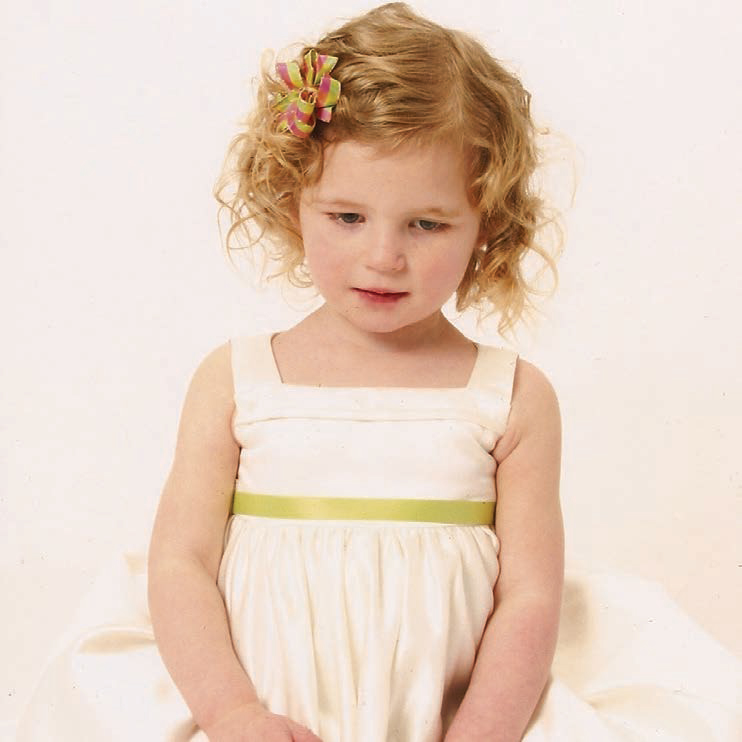
As told by her mother, Bonnie Fly.
How do you tell the story of someone who has no words? As her mother, I can only give my side of the story and just hope that I can put into words just how very special Sierra is.
Sierra was born at midnight on my 29th birthday. Although she had to spend 5 days in the NICU for ingesting meconium, Sierra was the perfect birthday present in every way. From birth, she was an easy and happy baby. She always had plenty of smiles and giggles to share. As new parents we were elated and mesmerized by “our little burrito” (as we called Sierra because she loved to be swaddled in the early months). Unfortunately, Sierra was also plagued with ear infections and respiratory problems much of her first year. She spent many nights screaming and even spent a week in the hospital with pneumonia. Even then she handled these illnesses better than most children would. We were so caught up with the illnesses that it wasn’t until eight months old that I realized that Sierra was not sitting up yet. We contacted our doctor who recommended seeing a neurologist, a developmental pediatrician and an Early Intervention program. As she got a little older, our fears expanded from her gross motor delays (caused by hypotonia) to other developmental areas. The doctors recommended that we do genetic testing. All of the doctors, including the Neurogeneticist who completed the testing, thought that Sierra just had hypotonia and that she “would just grow out of it.”
I will never forget the day (Friday, Nov. 9th, 2007) that I got the call telling me about Sierra. I was 6 months pregnant with my second daughter and a genetic counselor called and said that they had found a chromosomal deletion. They told me the deletion (22q13), that Sierra was mentally retarded, and not to look on the Internet until after we met with them for a consultation. It’s amazing how much a couple of minutes can alter your whole universe. I don’t think anyone can quite understand a moment like that. I will share my husband’s reaction, a very intimate moment, only because I think it puts the feelings into perspective. When I told him about the phone call, he cried, he cursed, he threw furniture, punched a wall and then he sat on the couch and said “It’s okay; Sierra and I will be best friends for life.”
It is ironic that I sit down and write this story 3 years later (almost to the day) that I found out. It is amazing what 3 years can do. Sierra is a happy, beautiful 4 year old girl. I don’t think anyone who looked at her beautiful face would
know that she has a chromosomal deletion (Phelan-McDermid Syndrome). However, if they spent a little time watching her, they would soon realize that she’s “different”. Even more, if they spent a little time trying to get to know her, they would come to love those differences.
In these 3 years, I am still amazed at the wave of emotions that come and go. In the beginning I grieved the loss of things that she may never experience (close friends, love, being a mother…). The wonderful thing about time (in my case 3 years) is that the feelings of grief come less often. They have been replaced with pure gratitude for having Sierra in my life. She has given me a new outlook on life. I, like so many others, have taken so much for granted. I am envious of Sierra’s overwhelming joy of the simple things in life (jumping up and down, going for a car ride, swinging, being tickled and hugged, watching Sesame Street…) I feel fortunate every day of my life that I was chosen to be her mother. Every day I am amazed by her ability to overcome the challenge(s) of the day. She wakes up with a smile and goes to bed with a smile despite all that she has to deal with. How many of us can say the same despite dealing with so much less?
As I said, Sierra cannot speak. Although she has no words, when she looks you in the eye, you know that she has so much to say. Recently, she has been getting frustrated with not being able to communicate or, even more so, with our lack of ability to understand what she wants to say. I simply cannot imagine not being able to communicate my wants and my needs. I am in awe of the ways that she has learned to communicate. She will grab the TV remote if she wants to watch a show, stand at the dining room table if she wants to eat, go to the front door if she wants to go for a walk or car ride, and my favorite, takes your hand in hers to lead you to what she wants. Although these are wonderful strides in a long road, they simply are not enough. We have spent days comforting our daughter as she screamed in pain. We have watched countless doctors helplessly search for the causes of this pain, but to no avail because they have no idea where to search.
My hope for writing this story is to help people realize that Sierra is not just a diagnosis. She is a wonderful child that if you took a step back from her “differences” and tried to know her you would simply find a precious little girl who loves to laugh, whose smile can melt your heart and who is so easy to love. My eternal hope for Sierra is that through science and technology that she will one day be able to tell her wants and needs and even more so, her own story.
